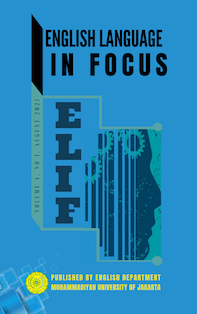English Needs Analysis for Sharia Bank Employees
DOI:
https://doi.org/10.24853/elif.4.1.33-40Keywords:
English needs, ESP, sharia bank employees.Abstract
The purpose of this study was to look into the English needs of Sharia bank employees in Semarang, Central Java. Qualitative research was used as the design research of this research. The subject of this research was 30 bank employees in one sharia bank in Semarang. Research data was collected by using interviews and questionnaires. The result of this research showed that: (1) Speaking and listening skills are more needed in their work especially as customer service than reading and writing skills; (2) Sharia bank employees also need English material especially in the terms of banking, accounting, and also computer programs. The employees need more about special terms relate to their jobs. Besides that, they also need skills in writing business correspondence for back-office positions.References
Chew, K. S. (2005). An Investigation of the English Language Skills Used by New Entrants in Banks in Hong Kong. English for Specific Purposes, 24(4), 423-435. https://doi.org/10.1016/j.esp.2005.02.004
Dudley-Evans, T., & St John, M. (1998). Developments in ESP A Multi-Disciplinary Approach. Cambridge: Cambridge University Press.
Hutchinson, T., & Waters, A. (1987). English for Specific Purposes A Learner-Centered Approach. Cambridge: Cambridge University Press.
Julian, C., Malana, M., & Calanoga, M. C. (2019). How’s My English? Communications Skills: A Relevant Indicator of Work Success. Asian EFL Journal, 24(4.2), 350-376. Retrieved from https://www.asian-efl-journal.com/
Karimi, P., & Sanavi, R. V. (2014). Analyzing English language Learning Needs Among Students in Aviation Training Program. Procedia-Social and Behavioral Sciences, 98, 852-858. https://doi.org/10.1016/j.sbspro.2014.03.491
Mohammadzadeh, S., Barati, T., & Fatemi, M. A. (2015). An Investigation into the English Language Needs of Bank Employees of Saderat Bank in Mashhad. Theory and Practice in Language Studies, 5(8), 1695-1702. http://dx.doi.org/10.17507/tpls.0508.21
Sakitri, W., Arief, S., & Maftukhah, I. (2017). Strategies Used by Indonesia Businessmen for Communication via Email in Global Trade Era. Asian EFL Journal Professional Teaching Articles, 102, 29-57. Retrieved from https://www.asian-efl-journal.com/
Tenzer, H., & Pudelko, M. (2013). Leading Across Language Barriers: Strategies to Mitigate Negative Language-Induced Emotions in MNCs. In Academy of Management Proceedings, Briarcliff Manor, NY 10510: Academy of Management (p. 12852). https://doi.org/10.5465/ambpp.2013.25
Tsurutan, C. (2018). Tone of Voice or What Was Said? The Impression Non-Native Speakers of English Make on Australian English Native Listeners. Journal of English as an International Language, 13(1), 80-90. Retrieved from https://www.eilj.com/
Wu, R. Y. F., & Chin, J. S. (2010, March). An Investigation into the English Language Needs of Banking and Finance Professionals in Taiwan. In Proceedings of the 12th Academic Forum on English Language Testing in Asia, Taipei (pp. 73-87). Retrieved from https://www.lttc.ntu.edu.tw/TLResource/Needs_Analysis_of_Banking_and_Financial_Professionals.pdf
Downloads
Published
Issue
Section
License
Authors who publish with this journal agree to the following terms:
- Authors retain copyright and grant the journal right of first publication with the work simultaneously licensed under a Creative Commons Attribution License that allows others to share the work with an acknowledgment of the work's authorship and initial publication in this journal.
- Authors can enter into separate, additional contractual arrangements for the non-exclusive distribution of the journal's published version of the work (e.g., post it to an institutional repository or publish it in a book), with an acknowledgment of its initial publication in this journal.
- Authors are permitted and encouraged to post their work online (e.g., in institutional repositories or on their website) before and during the submission process, as it can lead to productive exchanges, as well as earlier and greater citation of published work (See The Effect of Open Access).

